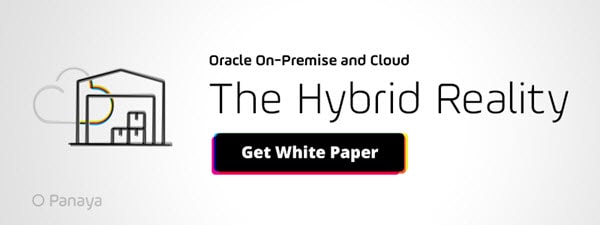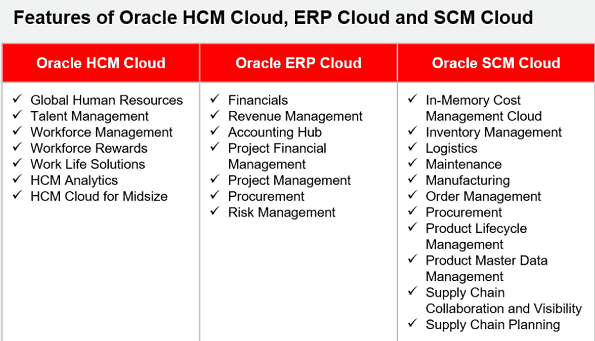Table of Content
Oracle’s Cloud Story
Oracle’s Cloud story started over a decade ago with “Fusion.” And, although Fusion isn’t marketed today, that doesn’t mean the cloud story is gone. Fusion was meant to take the best business process and practices from legacy applications and provide a cloud solution that integrated with on prem and cloud applications. And it did.
Today, some Fusion modules are bundled and sold within other products while the rebranding of Fusion itself turned into Oracle Cloud Applications, with three core cloud solutions: Oracle HCM Cloud, Oracle ERP Cloud and Oracle SCM Cloud. These three solutions make up today’s cloud suite and offer synchronized releases to simplify management and upgrades for those customers who purchase more than one offering.
Oracle ERP Cloud
The Oracle ERP Cloud offering is slightly different than what would be expected of an enterprise resource planning system, missing some components of traditional ERP solutions. The Oracle ERP cloud offering is focused around core financial management, with revenue, project, procurement and risk components, less rounded than Oracle EBS (see below). As of today, Oracle is a leader in Gartner’s Magic Quadrant for Cloud Core Financial Management Suites for Midsize, Large and Global Enterprises.
Oracle Graph
Oracle’s Automated Cloud Migration for Oracle ERP
In June 2018 Oracle introduced the Oracle Soar Package, proclaiming the world’s first automated cloud migration offering. The package aims at helping customers move their Oracle EBS and PeopleSoft solution from on-premise to their Oracle ERP Cloud. The packaged offering is a combination of conversion tools, data transformation services, training, consulting and support resources to make migration to the Oracle ERP Cloud Applications a relatively “hands free.” Oracle Soar includes a discovery assessment, process analyzer, automated data and configuration migration utilities, and rapid integration tools.
While the Oracle Soar offering dotes an easy move, it is specifically packaged for those customers with an Oracle EBS or PeopleSoft ERP install with few customizations. This changes the picture as Oracle EBS was built to allow invasive customizations, extensions, custom reports and integrations, and it was rightfully used by many.
The Cloud Push vs Cloud Adoption
So why the hard push with Oracle Soar? A recent Gartner survey shows that the move is on, with about half of respondents claiming to move at least one ERP function to the cloud. That same survey showed that almost 40% plan to start moving all their ERP functions to the cloud within the next 2-3 years. That’s a big number and Oracle wants to make sure that they don’t lose customers to other cloud ERP solutions.
However, Oracle understands the move to the cloud has many factors; company size, customized solution, organizational change management. In very complex landscapes of enterprise organizations, with significant customizations, cloud adoption is not uniform, and many will not move their entire ERP footprint to Oracle cloud, or any other cloud ERP. So, for many larger orgs, keeping their EBS current is still a strong strategy, and the question to ask is not is the product at end of life, but rather, am I still receiving value maintaining (both cost and efficiency) my EBS.
Is EBS really end of life
Oracle published an EBS roadmap and support schedule including a commitment to support EBS until at least 2030. So, the commitment to on premise is still there. And it should be. As of today, 65% of Oracle’s revenue is derived from maintenance payments from on prem solutions.
Also, Oracle continues to invest in E-Business Suite and the promise of Oracle EBS 12.3 will bring new features to keep Oracle EBS competitive in today’s market. This being said, Oracle EBS professionals can be confident in the solutions they are using today. In fact, in Gartner’s report, What Oracle ERP customers Need to Know About Oracle Cloud Applications, they advise “For customers that have EBS and are happy with it, there is no need to rush to replacement.”
So, while Oracle EBS is still relevant for IT managers, they still need to prepare for the eventual move. Read Five Practical Steps Oracle EBS Professionals Can Take Today to make sure they are prepared for their eventual move to the cloud.



